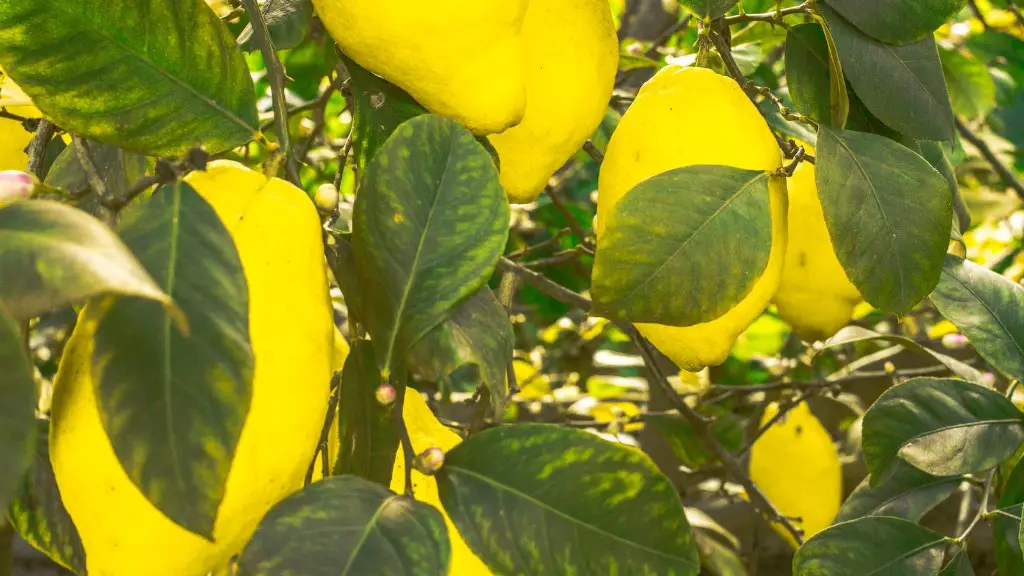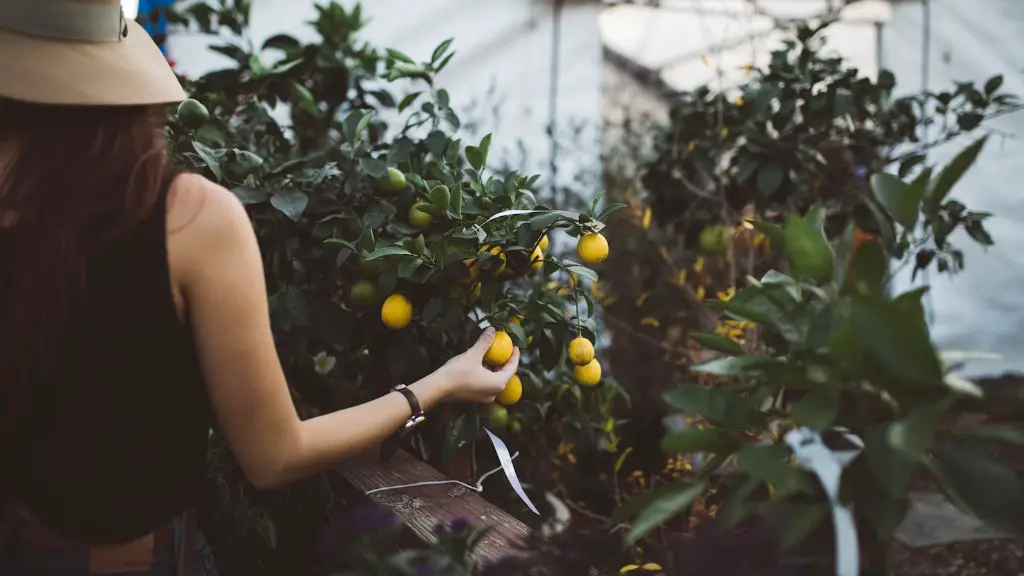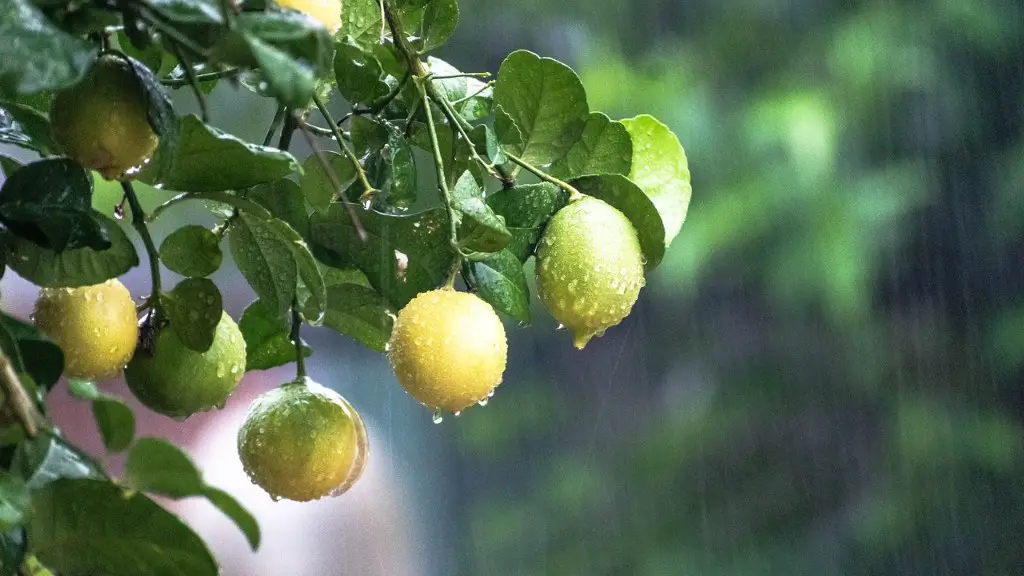Lemon trees are a popular choice for many homeowners because of their fragrant flowers and fruit. However, lemon trees are tropical plants and need special care to survive the winter in colder climates. Winterizing a lemon tree is essential to keep it healthy and prevent damage from the cold weather.
There are a few things you can do to winterize your lemon tree and help it survive the cold weather. First, make sure to give the tree plenty of water. Watering it deeply and regularly will help the roots stay healthy. Second, apply a layer of mulch around the base of the tree. This will help protect the roots from the cold. Lastly, you can wrap the tree in burlap or another type of fabric to help insulate it.
How do I protect my lemon tree in the winter?
You can protect your trees from freezing by building tripods around them and covering them with frost cloth or tarps on the coldest nights. This will help to keep the fruit on the tree from freezing as well.
Most citrus trees can handle a light frost, but any temperature below 32°F can be detrimental to its health. Keep your tree inside until you are sure the last spring frost in your area has passed, and the average nightly temperature is above 40°F before preparing to move your citrus tree outside.
How do you prepare citrus trees for winter
When preparing for a freeze, it is important to water the tree deeply and also the area surrounding it. This will help the tree to withstand the cold temperatures. For extra protection, you can wrap the trunk of the tree and also consider banking soil up on the trunk of small trees. To further protect the tree, you can drape a lightweight material over the entire tree, making sure it goes all the ground and is vented on sunny or milder days.
Meyer lemon trees are very cold hardy and can withstand temperatures down to about 20 degrees. If your area gets colder than that, your tree will need to be planted in a container and brought inside when the temperature drops.
Where do I put my potted lemon tree in the winter?
Citrus trees are often thought of as indoor trees, but they actually prefer indirect heat and good air circulation. Central heating can dry out the air and make it difficult for the tree to thrive. A porch or other similar area would be the ideal spot for a citrus tree.
If you live in an area with cold winters, it’s important to bring your Meyer lemon tree indoors when temperatures start to dip below 50 degrees Fahrenheit. Meyer lemon trees are happiest in temperatures between 50 and 80 degrees Fahrenheit, so bringing them indoors will help ensure they stay healthy and happy.
Should I bring my potted lemon tree in for the winter?
Unless you live in a zone with year-round warm weather, bringing your lemon trees indoors for the winter is essential for their survival. Indoor lemon trees are easy to care for, bring a welcome touch of green to your winter, give off a sweet, fragrant aroma, and best of all, bear fruit!
Lemon, lime, and citron trees are among the least cold-tolerant trees and can suffer damage when temperatures drop below 25ºF. Early-ripening varieties can be planted to harvest the fruit before cold weather arrives.
How do you wrap citrus trees for winter
If you have citrus trees that are under three years old, it’s best to leave the unripened fruit on the tree. Wrapping a thick insulating material around the tree trunk, such as burlap sheets or Dewitt N-Sulate blankets, can help protect the tree. If the citrus plant is in a container, you may want to move it to an area that shelters it from the wind.
If a hard freeze is on the way, there are several things you can do to help protect young citrus trees from cold damage:
-Wrap the trunk in cloth or bubble wrap
-Use tarps, old blankets or plastic sheeting to wrap the tree
-Mulch around the base of the tree
How often should I water my lemon tree in the winter?
Citrus trees need less water in winter, so only water them once every 3-4 weeks. This helps the tree stay in dormancy and save energy for next year’s growth spurt.
Citrus trees may require protection even in warmer climates, when temperatures drop toward freezing. Protect trees when temperatures drop to 29-32°F or below for 30 minutes or more. In USDA zones 8 and below, potted trees should be moved indoors when cold weather threatens.
Do potted lemon trees go dormant
Citrus trees do not go dormant like many other plants, so they need sufficient light and some humidity during the winter (although their growth will slow during this time). Citrus trees are tropical or semi-tropical plants and need warmth to grow and produce fruit. If you live in an area with cold winters, you will need to provide some type of shelter for your citrus trees during the winter months. Citrus trees need at least six hours of direct sunlight each day, so a south- or west-facing window is ideal. You can also use grow lights to provide the necessary light. Citrus trees also need high humidity, so be sure to mist them regularly or set them on a pebble tray filled with water.
Lemon trees are sensitive to temperature changes and can lose their leaves if they are brought indoors after being exposed to cold temperatures outside. Avoid big temperature swings and maintain a consistent temperature and humidity level to keep your lemon tree healthy.
How long do lemon trees last in pots?
Lemon trees are a type of citrus tree, and as such, have a fairly long lifespan compared to other types of trees. They usually live for 30-50 years, but can reach up to 100 years old in ideal conditions. Indoor potted lemon trees tend to have shorter lifespans than those planted outdoors, however, due to the less than ideal growing conditions.
When growing an indoor lemon tree, it is important to keep the soil moist. Choose a well-draining potting mix that is designed for indoor palm trees or citrus. These mixes will help prevent soggy soil while still retaining moisture. This will ensure that the roots do not get too wet or too dry.
Can you keep a lemon tree potted
If you experience cooler weather during the fall and winter months, you may want to consider growing a potted lemon tree indoors. Lemons are self-pollinating, so only one tree is needed to produce fruit. Plus, growing a lemon tree indoors can brighten up your home and provide a refreshing, citrusy scent.
Lemon trees are ideal for bright, well-ventilated locations that are away from any central heating or cold drafts. Unheated conservatories and hallways are great places for your tree. Your tree will need a good amount of sunlight each day, so place it in a location that gets at least 6 hours of good filtered sunlight daily.
Warp Up
There are a few key things to do when winterizing a lemon tree. First, prune the tree to remove any dead or diseased branches. This will help the tree to focus its energy on healthy growth. Next, water the tree deeply and regularly throughout the winter to keep the roots healthy. Finally, apply a layer of mulch around the base of the tree to help protect the roots from the cold.
There are a few simple steps to winterizing a lemon tree. First, stop feeding the tree fertilizer two months before the first frost is expected. Second, water the tree deeply but less frequently in the fall so that the roots have a chance to dry out before the ground freezes. Finally, cover the tree with a plastic sheet or burlap sack to protect it from the cold.




